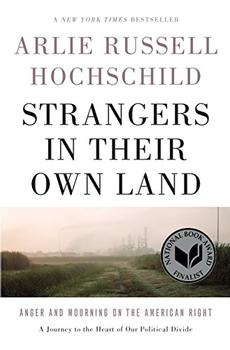Summary | Excerpt | Reviews | Beyond the Book | Readalikes | Genres & Themes | Author Bio

Critics' Opinion:
Readers' Opinion:
First Published:
Sep 2016, 368 pages
Paperback:
Feb 2018, 368 pages
 Book Reviewed by:
Book Reviewed by:
Donna Chavez
Buy This Book
Empathy Walls
You might say I'd come to Louisiana with an interest in walls. Not visible, physical walls such as those separating Catholics from Protestants in Belfast, Americans from Mexicans on the Texas border, or, once, residents of East and West Berlin. It was empathy walls that interested me. An empathy wall is an obstacle to deep understanding of another person, one that can make us feel indifferent or even hostile to those who hold different beliefs or whose childhood is rooted in different circumstances. In a period of political tumult, we grasp for quick certainties. We shoehorn new information into ways we already think. We settle for knowing our opposite numbers from the outside. But is it possible, without changing our beliefs, to know others from the inside, to see reality through their eyes, to understand the links between life, feeling, and politics; that is, to cross the empathy wall? I thought it was.
I'd asked Mike Schaff to show me where he'd grown up because I wanted to understand, if I could, how he saw the world. By way of introduction, I'd told him, "I'm from Berkeley, California, a sociologist, and I am trying to understand the deepening divide in our country. So I'm trying to get out of my political bubble and get to know people in yours." Mike nodded at the word "divide," then quipped, "Berkeley? So y'all must be communist!" He grinned as if to say, "We Cajuns can laugh, hope you can."
He wasn't making it hard. A tall, strongly built man in tan-rimmed glasses, he spoke succinctly, in a low near mumble, and was given both to soulful, sometimes self-deprecating, reflection and stalwart Facebook proclamations. Explaining his background, he said, "My mom was Cajun and my dad was German. We Cajuns call ourselves coon asses. So since I was half Cajun, and half German, my mom called me half-ass." We laughed. Mike was one of seven children his dad had raised on a plumber's wage. "We didn't know we were poor," he said, a refrain I would hear often among those I came to know on the far right, speaking of their own or their parents' childhoods. Mike had an engineer's eye, a sportsman's love of fish and game, and a naturalist's ear for the call of a tree frog. I didn't know any members of the Tea Party, not to really talk to, and he didn't know many people like me. "I'm pro-life, pro-gun, pro-freedom to live our own lives as we see fit so long as we don't hurt others. And I'm anti–big government," Mike said. "Our government is way too big, too greedy, too incompetent, too bought, and it's not ours anymore. We need to get back to our local communities, like we had at Armelise. Honestly, we'd be better off."
Not only have the country's two main political parties split further apart on such issues, but political feeling also runs deeper than it did in the past. In 1960, when a survey asked American adults whether it would "disturb" them if their child married a member of the other political party, no more than 5 percent of either party answered "yes." But in 2010, 33 percent of Democrats and 40 percent of Republicans answered "yes." In fact, partyism, as some call it, now beats race as the source of divisive prejudice.
When Americans moved in the past, they left in search of better jobs, cheaper housing, or milder weather. But according to The Big Sort: Why the Clustering of Like-Minded Americans Is Tearing Us Apart by Bill Bishop and Robert G. Cushing, when people move today, it is more often to live near others who share their views. People are segregating themselves into different emotionally toned enclaves—anger here, hopefulness and trust there. A group of libertarian Texans have bought land in the salt flats east of El Paso, named it Paulville, and reserved it for enthusiastic "freedom-loving" followers of Ron Paul. And the more that people confine themselves to likeminded company, the more extreme their views become. According to a 2014 Pew study of over 10,000 Americans, the most politically engaged on each side see those in the "other party" not just as wrong, but as "so misguided that they threaten the nation's well-being." Compared to the past, each side also increasingly gets its news from its own television channel— the right from Fox News, the left from MSNBC. And so the divide widens.
Copyright © 2016 by Arlie Russell Hochschild . This excerpt originally appeared in Strangers in Their Own Land: Anger and Mourning on the American Right, published by The New Press Reprinted here with permission.





The Flower Sisters
by Michelle Collins Anderson
From the new Fannie Flagg of the Ozarks, a richly-woven story of family, forgiveness, and reinvention.

The House on Biscayne Bay
by Chanel Cleeton
As death stalks a gothic mansion in Miami, the lives of two women intertwine as the past and present collide.

The Funeral Cryer by Wenyan Lu
Debut novelist Wenyan Lu brings us this witty yet profound story about one woman's midlife reawakening in contemporary rural China.
Your guide toexceptional books
BookBrowse seeks out and recommends the best in contemporary fiction and nonfiction—books that not only engage and entertain but also deepen our understanding of ourselves and the world around us.